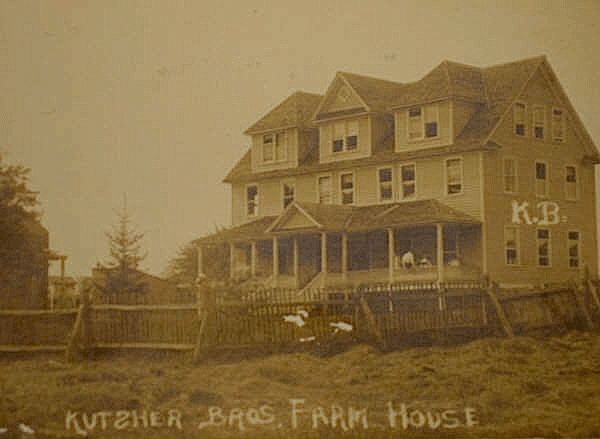by David

Kutsher's Pastrami
I walked in to Kutsher?s Tribeca with my dad at about 12:45 PM. A smattering of other customers were there, but the place was large, so it felt more sparsely populated than it actually was. The decor is fancy, upscale, but the atmosphere was just to my liking: brightly lit, with barely audible music in the background (I like to see my food and converse with the people I?m eating with). Later, the owner, Zach Kutsher, told me that it?s a completely different restaurant at night. ?We turn the music up, turn the lights down, have a whole different menu.? I?d like to try that food, but might find that a little noisy.
Before I continue, let me emphasize that I highly recommend the place. The food I ate was absolutely delicious, and the service was excellent. My dining experience this afternoon was, on the whole, lovely.
It didn?t start off that way. When the waiter told me they made their own sodas (or soft drinks, in Canada), I decided to order their vanilla black cherry. Anyone with any sense of tradition (or any sense at all, really) knows you order Black Cherry at a deli. In Canada, that means Cott?s, which takes like a super-sweet delicious brand of cough medicine, in a good way (I?m not kidding). Virgil?s, Stewart?s or Doctor Brown?s in the good ?ol US of A work too. But this drink didn?t taste like any of those products. It tasted like drinking vanilla. Pure vanilla, with barely hint of cherry. Now normally I don?t like vanilla because I consider it too plain, too, you know, vanilla. But this was too potent. The beverage wasn?t even the right colour, a clearish reddish liquid rather than a syrupy eggplant reminiscent of unrefined oil.
I told the waiter (politely) how I felt, and he immediately offered me another drink, on the house. He recommended the ginger ale. I acquiesced. Unfortunately, that came to a similar result. It tasted like drinking ginger. It was moderately more tolerable than the black cherry, but if I was wandering for 40 years in the desert, thirsty, and I was offered either of these two drinks, I think I?d hold off for the next oasis.
The third drink I was offered, again on the house, was an apple soda. This was actually quite enjoyable; tasted like drinking apple sauce, but in a good way.
But enough about the drinks. I still cling to the Jackie Mason stereotype that Jews don?t care about drinks, alcoholic or otherwise. I came to eat, and I ate well. My father and I shared a pastrami sandwich, though I easily could have had my own. They weren?t as massive as Katz?s, but they were much more affordable, and at least as good. The meat wasn?t as moist as Katz?s, but it was more flavorful, more reminiscent of Montreal Smoked meat, at Schwartz?s or Mile End Deli, than your typical New York pastrami. The french fries were also good, and the matzoh ball soup was spectacular. Though it did not possess that comforting yellow glow I?m used to from deli soups, it tasted great, and came in a very hearty portion.
Most interesting, however, was the conversation with the waiter, manager, and owner, Zach Kutsher, grandson of the owner of the famous Kutsher?s hotel in the Catskills, a Borscht-belt landmark which had a well-known and beloved kosher dining room. They were very proud of the place?s heritage, and the waiter insisted that there were ?lots of Jews? there, not just the customers, but the wait staff, cooks, managers, and proprietors. Yet nobody we talked to would commit to calling Kutsher?s Tribeca a deli. The various terms they used included ?deli-chic? and ?upscale nouveau Jewish cuisine? and, like it says on the website, a ?modern Jewish American bistro.?

Kutsher's resort in the Catskills, back in the day, before it expanded
This got me thinking about my advisor Hasia Diner?s book,?Hungering for America,?about how Jewish, Italian, and Irish immigrants used food traditions (or in the Irish? case, the lack of said traditions) to consolidate their cultures in the United States. Jewish immigrants from all over Europe (and to a lesser extent Asia, North Africa, and the Middle East), brought different foods and recipes that blended together to create an American Jewish cuisine (similarly, Italian food was created in America, not Italy, where food is much more regional). Kashrut, the Jewish dietary laws, though not always strictly obeyed, provided an over-arching, unifying framework.
At the same time, developing these new, Americanized food traditions helped the immigrants integrate and acculturate. Today, Jews are thoroughly comfortable in America, integrated and acculturated. Restaurants like Kutsher?s, which shun the word deli but attempt to preserve something of the Jewish tradition, are all about asserting Jewish particularism within a modern, American framework. Kutsher?s is explicitly non-kosher, like the restaurant Traif?in Williamsburg or?Top Chef?s Ilan Hall?dressing up a matzoh ball with bacon.?But in rejecting kashrut, they are also explicitly Jewish, building a new American Jewish culinary tradition, in line with all the modern techniques of nouveau cousine, but with a nod to the old country. Like my friend Noah Bernamoff?of Mile End Deli,?these Jewish culinary adventurers get to explore strange new worlds of food while still holding on to their Jewish roots. They get to build something new, a hybrid cuisine, Jewish, American, and whatever else entices them.
Kutsher?s does this all very well. For those who?d like a quiet deli feel and a delicious pastrami sandwich, go at lunch. For a swankier soiree with a health dose of Hebraic goodness, go for dinner. And come hungry.
Like this:
4 bloggers like this post.
meghan mccain wilson chandler bristol motor speedway bryce harper puerto rico prometheus grand canyon skywalk
No comments:
Post a Comment
Note: Only a member of this blog may post a comment.